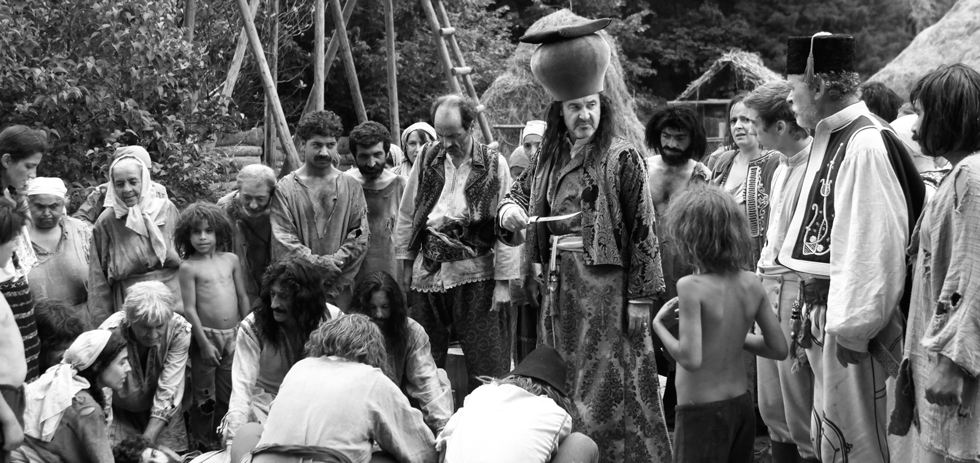
A boisterous black-and-white Romanian faux-western should not, by rights, be this funny, this jaw-droppingly well photographed, or this incisive in its depiction of society and history. Whatever black magic director Radu Jude must have conjured from its gypsy characters has worked a treat, though, for Aferim! is a chaotic churn through a forgotten slice of Carpathian life, which melds the pugnacious spirit of Southern European cinema with the formal playfulness of the modern art film to achieve a wild freeform atmosphere while adhering to the most classical of narratives. Equally fascinating is the film’s status as a quasi-evolution of the Romanian New Wave epitomised by films like 12:08 East of Bucharest and 4 Months, 3 Weeks and 2 Days, whose utter blackness may be transplanted into unfamiliar surrounds rather than grim provincial cities, but which remains, both in the dramatic and comedic senses. Mulling over Aferim! post-screening is a discomfiting experience precisely because of its brilliance – it’s impossible to escape the nagging feeling that enough cannot quite be said. Instead, like the thinking man’s 2014 SFF darling Fish & Cat, the film conveys a national cinema growing into its own, via a work so dense yet watchable that it eats away interminably at whatever part of the brain is responsible for loving the cinema.
The plot of Aferim! seems, appropriately considering the amorality of most of its characters, to be tea-leafed shamelessly from vague dreams about Sergio Leone and John Ford films. In 1830s Wallachia,1 aging lawman John Wayne Constandin (Teodor Corban) accepts a tender from the local boyar to hunt, apprehend and return to him a gypsy slave who has escaped, for reasons initially unknown. Constandin, draped in the kind of heraldry and finery only ever worn by men who are well-off but not truly rich, takes along his teenaged son and protégé Ionita, played by Mihai Comanoiu, who expertly plays off a kind of Balkan Michael Cera vibe against moments of wide-eyed immaturity and wannabe toughness. Meandering through hills and marshes which recall a gunky, plebeian Shire of Middle-Earth, the duo eventually come across Corfin the slave and transport him to his fate. In the midst of this plain narrative, though, are contained dozens of small and not-so-small encounters with gypsies, peddlers, whores, minor lords, travelling Ottomans,2 drunken revellers, and at least one impromptu fairground. The dialled-up high contrast monochrome of Marius Panduru’s cinematography serves to evoke not only the classic Westerns from which it borrows, but also the decidedly more austere Eastern European and Soviet historical dramas of the Sixties. A black and white scheme, here, also enforces a perceptive wall between the viewer and the screen, putting its events in relief with the gravitas of ‘real’ history, like a woodcut or medieval tapestry.
Conjuring both the laxity of black comedy (particularly in Constandin’s endlessly inventive tongue for crudeness; his foul-mouthed lectures to his son on the dangers of women, poor folk, and foreigners are savagely funny) and the darker tone of the historical drama – allows Jude to moderate the cruelty on display with a satirical edge which places the film in the company of other Romanian New Wavers, which tended to aim at the Ceausescu regime.3 In this way, the pivotal plot role of slavery, a practice most viewers will be shocked to find still occurred in Europe in the 19th Century, is depicted with the requisite starkness – the penultimate scene is not the happy end for the unfortunate Corfin that we hope for – while also being allowed to coexist with the pure anarchic energy given off by Constandin.
Ultimately, the greatest achievement of Aferim! is its success in measuring each of the ideas it toys with perfectly; there’s no sense that the film is ‘about’ the condition of slavery, or a point in Romanian history, or father-son relationships, or the role of the everyman in oppression, but it does deal with all of these, while maintaining textbook dramatic tension and wedging in a few belly laughs for good measure. A sense of the inability of average men to transcend their averageness, though, does permeate its later scenes, and comes as close anything to bookending Aferim!’s captivating hundred minutes. Seeing the final shot of Constandin and Ionita walking off down another nondescript trail, I genuinely expected the camera to pan to the right, their conversation to change topic, and the scene to revert to the same one picked up in medias res at the film’s beginning, revealing a cyclical fantasy element to the story. For my money, any film inventive enough to make a viewer not just hope for but actively anticipate subversion is doing something right.
Around the Staff
| Brad Mariano | |
| Ian Barr | |
| Conor Bateman | |
